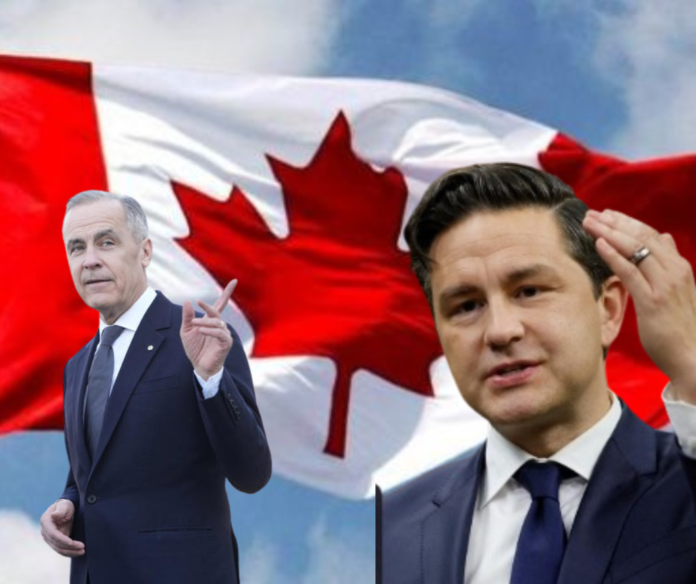In politics, few things are more powerful or more confusing than a change of heart. That is exactly what Canadians witnessed this year when newly sworn-in Prime Minister Mark Carney began walking back some of the very policies his Liberal Party once championed. Strikingly, many of these shifts mirror long-standing proposals from his political rival, Conservative leader Pierre Poilievre.
For African diasporans in Canada, many of whom came here in search of opportunity, stability, and fairness, the sudden role reversal has raised difficult questions. Is consistency a sign of strong leadership? Is changing your mind a sign of growth, or just election season theatre? And most importantly: what does any of this mean for the average working family trying to get ahead in a high-cost country?
Capital Gains Tax: A Rich Man’s Game or Everyone’s Problem?
Then: In 2024, Justin Trudeau’s Liberal government raised the capital gains inclusion rate. Now, if you made a profit selling a property or stocks and earned over $250,000, you would pay tax on two-thirds of it instead of half.
Why it happened: The idea was to make the wealthy pay more and fund public needs like affordable housing and healthcare.
Poilievre’s view: He fiercely opposed it, arguing it scares away investors, kills job creation, and punishes success. His alternative is to let people skip the tax if they reinvest profits into Canadian ventures.
Carney’s pivot: In 2025, shortly after taking over, Carney canceled the hike. Critics say it is a political move to look more business-friendly ahead of the April 28 elections.
Impact: For everyday Africans in the diaspora trying to build wealth, this tax could affect small business exits, rental property sales, or even long-term investing. If fewer people invest, fewer jobs may be available and that hits communities like ours the hardest.
Carbon Tax: Climate Cure or Economic Curse?
Then: Introduced in 2019 under Trudeau at $20 per tonne. Since then, it has been increasing and each year, it was designed to increase until it reaches $170 per tonne in 2030. The goal was to encourage people and businesses to use less fossil fuel and switch to cleaner energy options. The government returned some of the money through rebates.
Poilievre’s position: Since at least 2022, he has pushed to “axe the tax,” claiming it drives up living costs and does little to cut emissions.
Carney’s move: On his first day in office, Carney scrapped the consumer carbon tax. Gone. Just like that.
The diaspora lens: Lower-income African families in places like Brampton, Scarborough, or Winnipeg often live farther from work and use more gas. Rebates helped, but not always enough. Scrapping the tax might feel like relief at the pump, but without a new climate plan, what will future generations breathe? That is if the climate catastrophe is as real as being touted.
Interprovincial Trade Barriers: An Unseen Wall Inside Canada
The problem: Rules and red tape make it harder to do business or work across provincial lines. Think about being a truck driver who can’t operate in another province, or paying more for meat from next door.
Poilievre’s approach: He has long demanded national standards and incentives to remove these barriers.
Carney’s signal: Not fully committed yet, but his economic rhetoric suggests he might be open to it.
Why this matters: For diasporans who own small businesses or work in trades, being able to move and grow freely across provinces could mean more money, more jobs, and more freedom. This is a quiet but powerful way to boost opportunities for immigrants.
Pipelines and Resource Development: Jobs vs. the Environment?
The backstory: Trudeau’s Liberals talked green but also bought the Trans Mountain pipeline to keep it alive. They passed strict environmental laws that made building new ones hard.
Poilievre’s pitch: He wants pipelines approved faster, rules relaxed, and energy jobs booming, especially in Alberta.
Carney’s update: Promises quicker development to boost the economy, signaling a clear break from the old Liberal stance.
Our reality: Many African newcomers work in trades, transportation, or construction industries tied to pipelines. More projects could mean more jobs. But where is the line between development and climate damage? That’s the tension.
So…Was Poilievre Right All Along?
Maybe. His warnings about job losses, investor flight, and rising costs now look more valid with Carney adopting similar policies. But being “right” isn’t just about winning an argument. It is about delivering real solutions that work for all Canadians.
What Poilievre gets right: Consistency. You may not agree with everything he says, but he has stayed the course. That builds trust.
What he lacks are detailed plans, especially regarding climate. Critics say his simplicity masks serious gaps.
What Carney gets right: He listens to Canadians and adjusts. That is flexibility.
What he risks: Trust. If voters feel the switch is just to win elections, they may see him as opportunistic rather than visionary.
Trust: Is It About Principles or Performance?
For African diasporans, who often arrive in Canada with high hopes and few safety nets, trust in leadership is deeply personal. We don’t have time for empty promises. We want real, workable ideas, whether from the left, right, or somewhere in between.
Poilievre’s appeal: He sounds like a fighter. That resonates in a community that has had to fight to be seen and heard.
Carney’s appeal: He is polished and measured. That appeals to immigrants who value order, respectability, and systems that work.
But politics is not Tinder, you don’t swipe for vibes. You vote for the person who will make your rent affordable, your job secure, and your kids’ futures brighter.
The Bigger Picture: Why Politicians Change Their Minds
It’s not new. Leaders flip when the public shifts.
- Trudeau kept the carbon tax until it sank him in the polls.
- Harper ran on no deficits, then ran one after the 2008 crash.
- Even Pierre Trudeau, hailed as a progressive, suspended civil liberties during a crisis.
Sometimes, it is wisdom. Sometimes, survival. The test is whether the change benefits people or just politicians.
What Should African Canadians Watch For?
- Policy over personality. Don’t get swept up in slogans. Ask how any proposal affects your job, family, and future.
- Promises vs. track records. Who has done what? Talk is cheap, especially in campaign season.
- Who benefits most? Does a tax cut help you or a billionaire on Bay Street? Will a pipeline job come to your town or skip it?
- Climate costs. Don’t ignore the environment. Climate disasters hit vulnerable communities first. We need solutions that protect both jobs and the air.
- Long-term vision. Who is building for tomorrow, not just spinning today’s headlines?
Final Word: Don’t Be Played, Be Informed
For African diasporans in Canada, this moment is a reminder that politics is not about picking a team; it is about securing a future. You don’t owe loyalty to any party, only to your values, your well-being, and your community.
Maybe Poilievre has been right about some things. Maybe Carney is learning from his mistakes. Maybe both are playing chess with voters’ lives.
You decide. But decide with clarity, not emotion. Our parents came here for the better. Let us make sure we hold leaders to that promise.
Have thoughts? Share them with us. Which policy shift matters most to you?






